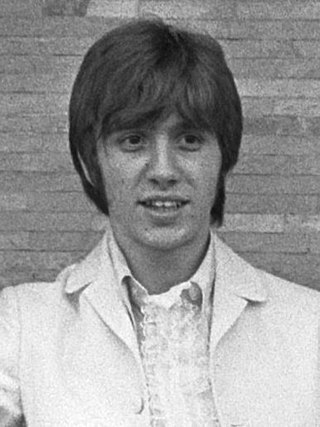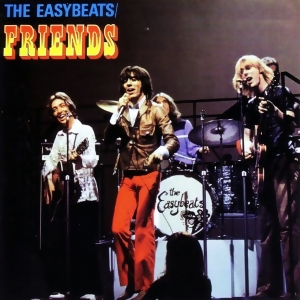Related Research Articles

The Easybeats were an Australian rock band which formed in Sydney in late 1964. They are best known for their 1966 hit single "Friday on My Mind", which is regarded as the first Australian rock song to achieve international success; Rolling Stone described it as "the first international victory for Oz rock". One of the most popular and successful bands in the country, they were one of the few Australian bands of their time to foreground their original material; their first album Easy (1965) was one of the earliest Australian rock albums featuring all original songs.

Strictly Ballroom is a 1992 Australian romantic comedy film directed and co-written by Baz Luhrmann in his feature directorial debut. The film is the first in his "Red Curtain Trilogy" of theatre-motif-related films; it was followed by 1996's Romeo + Juliet and 2001's Moulin Rouge!

John Inglis Young, OAM, known professionally as John Paul Young, is an Australian pop singer who had his 1978 worldwide hit with "Love Is in the Air". His career was boosted by regular appearances as a performer and guest host on Countdown, a 1974–1987 TV series for Australia's national broadcaster ABC. Besides "Love Is in the Air", Young had top ten chart success in Germany and the Netherlands with "Standing in the Rain" and four other top ten hits in South Africa, including No. 1 hits with "I Hate the Music" in 1976 and "Yesterday's Hero" in 1975.
Rock music in Australia, also known as Oz rock, Australian rock, and Aussie rock, has a rich history, rooted in an appreciation of various rock genres originating in the United States and Britain, and to a lesser extent, in continental Europe and Africa. Australian rock has also contributed to the development of some of these genres, as well as having its own unique Australiana sound with pub rock and its Indigenous music.

Johannes Hendrikus Jacob van den Berg, better known as his stage name Harry Vanda, is an Australian musician, songwriter and record producer. He is best known as lead guitarist of the 1960s Australian rock band the Easybeats who with fellow member George Young formed the 1970s and 1980s songwriting and record production duo Vanda & Young.

George Redburn Young was an Australian musician, songwriter and record producer. He was a founding member of the bands The Easybeats and Flash and the Pan, and was one-half of the songwriting and production duo Vanda & Young with his long-time musical collaborator Harry Vanda, with whom he co-wrote the international hits "Friday on My Mind" and "Love Is in the Air", the latter recorded by John Paul Young.

Stephen Carlton Wright was an Australian singer, songwriter, and musician. Called Australia's first international pop star, he is best known for being the lead singer of the Easybeats, who are widely regarded as the greatest Australian pop band of the 1960s.

"Friday on My Mind" is a 1966 song by Australian rock group The Easybeats. Written by band members George Young and Harry Vanda, the track became a worldwide hit, reaching No.16 on the Billboard Hot 100 chart in May 1967 in the US, No.1 on the Dutch Top 40 chart, No.1 in Australia and No.6 in the UK, as well as charting in several other countries. In 2001, it was voted "Best Australian Song" of all time by the Australasian Performing Right Association (APRA) as determined by a panel of 100 music industry personalities. In 2007, "Friday on My Mind" was added to the National Film and Sound Archive's Sounds of Australia registry.
Albert Productions, a division of music publishing and recording company Albert Music, is one of Australia's longest established independent record labels to specialise in rock and roll music. The label was founded in 1963 by Ted Albert, whose family owned and operated the Sydney music publishing house J. Albert & Son.

Easy is the debut studio album by the Australian rock band the Easybeats, released on 23 September 1965.

It's 2 Easy is the second studio album by Australian rock band the Easybeats. Released on 24 March 1966, the album featured four hit singles; "Wedding Ring", "Sad and Lonely and Blue", "Women " and "Come And See Her".

Volume 3 is a studio album by the Australian rock band The Easybeats, released on 3 November 1966. It was the third and final album from the group recorded in Australia before relocating to England.

The Best of The Easybeats + Pretty Girl is the first compilation album by The Easybeats featuring a selection of songs recorded by the group between 1965 and 1966. The album was originally released in Australia and New Zealand under the Parlophone label under the then current licensing arrangement by the band's production company Albert Productions.

Friends is the sixth and final studio album by Australian rock band the Easybeats. It was released in early 1970 as part of the group's new recording contract with Polydor Records. It would be the only album Polydor released of the band as they broke up before its release.

Vanda & Young were an Australian songwriting and producing duo composed of Harry Vanda and George Young. They performed as members of 1960s Australian rock group the Easybeats where Vanda was their lead guitarist and backing singer and Young was their rhythm guitarist and backing singer. Vanda & Young co-wrote most of the Easybeats' later hits including their international hit "Friday on My Mind" and they were the record producers for the group from 1967. Young was the older brother of Malcolm and Angus Young of the hard rock band AC/DC and also the record producer behind several of the band's biggest albums.
Marcus Hook Roll Band were a rock group formed in London in 1972, by Harry Vanda and George Young as a session band to record their songwriting efforts. The group had two versions from London and Sydney – formed in mid-1973, when Vanda and Young returned to Australia. They issued three singles – "Natural Man" (1972), "Louisiana Lady" (1973) and "Can't Stand the Heat" (1974) – and one album – Tales of Old Grand-Daddy (1974). It is noted for featuring Malcolm and Angus Young prior to forming AC/DC.

Good Friday is the fourth studio album by The Easybeats, released in May 1967. It was the first album released after the band signed an international recording deal with United Artists Records. The original UK album was released in May 1967. Although "Friday on My Mind" was a big single in the UK, the album failed to make the top 40.

Friday On My Mind is the first North American album from The Easybeats. The album was released as Good Friday in Europe, in the same month. This version omitted "Hound Dog" and replaced it with "Women" from the Australian It's 2 Easy album.

"For My Woman" is a song by Australian rock band the Easybeats, written by singer Stevie Wright and guitarist George Young. The Easybeats had formed in Sydney in 1964, with a sound inspired by the Pretty Things and the Rolling Stones. After signing with their manager Mike Vaughan, he introduced the band to producer and businessman Ted Albert, who liked them enough to sign with his company Albert Productions in December 1964. The song was recorded in January 1965 at the 2UW Theatre in Sydney as a demo together with three other songs.

"Come and See Her" is a song written by Stevie Wright and George Young. It was released as the sixth single for their Australian rock group the Easybeats in April 1966, which reached No. 3 on the Australian charts. It was the group's debut single in the United Kingdom, issued on the United Artists Records in July.
References
- ↑ Register for BDM NSW Entry
- 1 2 Company history Albert Music website
- ↑ "Albert, Michel François (Frank) (1874–1962)", Australian Dictionary of Biography, Volume 7, Melbourne University Press, 1979, pp 27–28
- ↑ Albert Family profile, Australian Financial Review Magazine, December 2009, Fairfax Media Ltd
- 1 2 3 4 5 6 Albert Productions, Milesago: Australasian Music & Popular Culture 1964–1975,website
- ↑ Ted Record producer, music publisher,
- 1 2 3 Abrahams C, (2005) Studio Connections: Studio Picture Book
- ↑ Abrahams C, (2005) Studio Connections.ALBERT STUDIO 1
- ↑ Interview with Colin Abrahams, No Nonsense AC/DC webzine.Weblink Archived 2 May 2007 at the Wayback Machine
- 1 2 Death notice, Sydney Morning Herald , 14 November 1990
- ↑ The Dragon class in Australia, Australian International Dragon Association, 2007